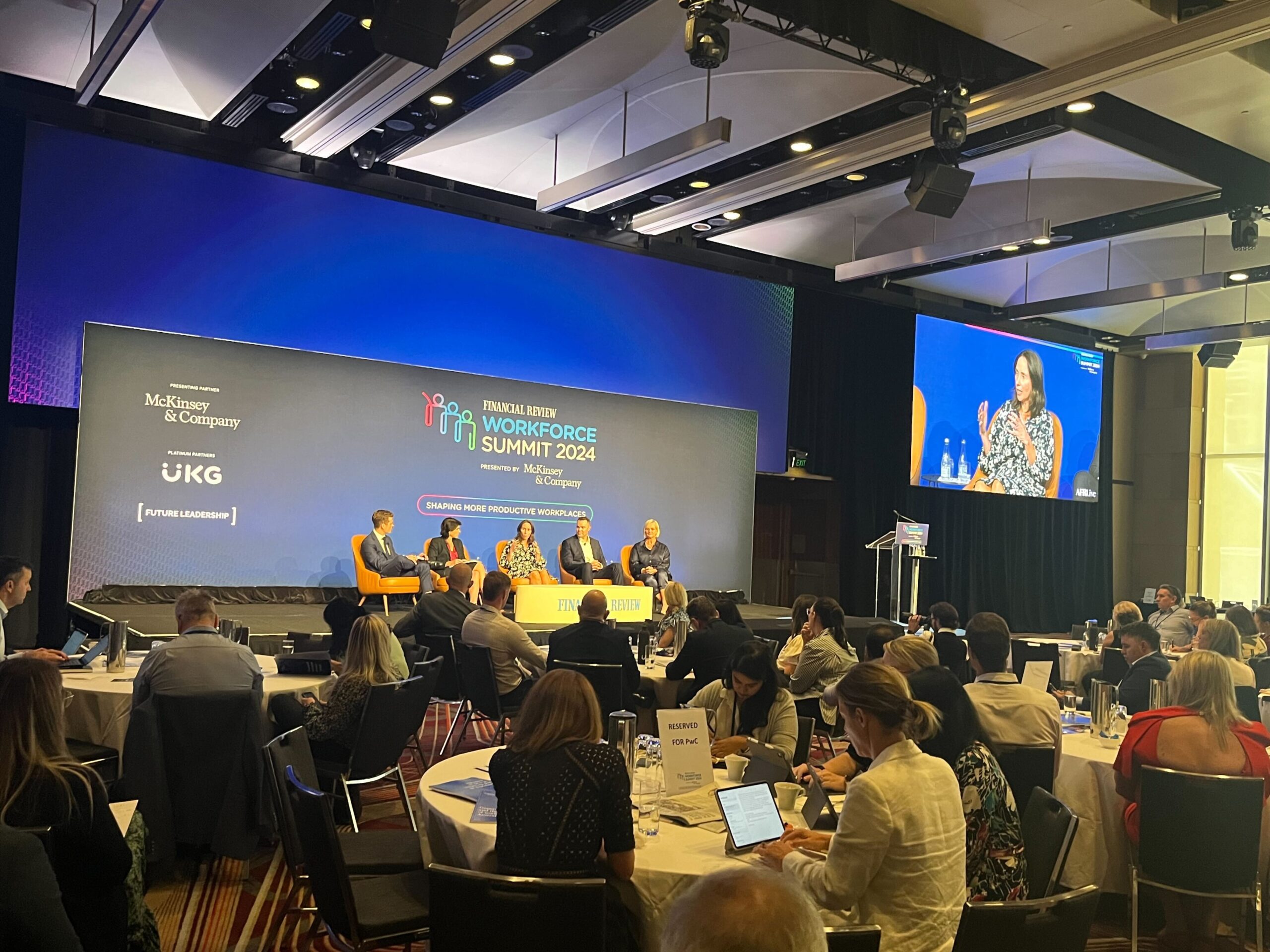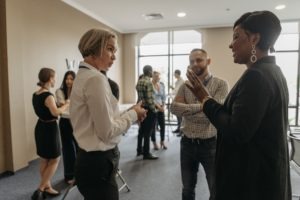Heidi is the COO and Co-Founder of Mentorloop. She recently attended the AFR Workforce Summit 2024 which was held in Sydney, Australia on the 12th of February 2024.
You can find the Summit’s Agenda here.
I recently attended the AFR Workforce Summit in Sydney, a convergence of Australia’s people leaders to explore, discuss and debate the Future of Work. It was a great opportunity to hear from companies like Medibank, J.P. Morgan, Canva and M&C Saatchi – the trend-makers in human capital development across policy, companies and the media.
With a number of industrial relations reforms coming into legislation recently along with the rise of generative AI over the last 12 months, these 2 themes dominated the conversation throughout the day. Four years post-pandemic, it appears that hybrid working models continue to be a point of contention. And while some companies have firmed up their approach, no one was willing to admit they’ve cracked the code in identifying a winning approach!
These discussion points levelled up to a macro conversation on productivity, and while Danielle Wood, CEO of the Productivity Commission, felt we are turning a corner into more positive territory, there is still an element of uncertainty around productivity drag.
What impact does WFH have on developing the next generation of workers? How long will it take to see the productivity uplift from the need for businesses to adapt and change their operating models to unlock the benefits of Gen AI?
These are the questions we need to ask, especially as Australia is currently lagging behind other OECD nations in the adoption of AI.
Here are a few of the key discussion points from the day.
Hybrid Working Experimentation
Many companies are experimenting with hybrid work models and different approaches are being deployed. For example, Medibank allows their teams to decide, J.P. Morgan mandates an office-based culture, while Canva and M&C Saatchi give teams autonomy with no mandates.
Challenges in this area include maintaining informal mentoring relationships and replicating spontaneous conversations in remote work settings. Pulse surveys still feature heavily to gather qualitative feedback and insights.
Leadership and Organizational Culture
Leaders are rediscovering the importance of imagination and courage in their roles as leaders. There’s also a renewed focus on leaders lifting performance through leadership, culture, and disagreement.
One of my favourite takeaways from the day came from Deb Yates, Chief People Officer of Lendlease. She talked about the value of developing the harder skills to acquire and develop – the “soft skills” – leadership and culture – nice to a kind culture – rules to principles. These soft skills are what contribute to the aforementioned leadership, culture, and disagreement. She emphasised the need to relearn how to disagree with each other in a productive way – taking in different views from people with different perspectives – as these are the interactions that drive innovation and productivity.
She says, “We’ve forgotten the art of disagreement. Life is not so binary – let’s sit in the ‘and’ a little more! We owe our people the skills to be able to disagree and argue a different perspective.”
Alongside this sentiment, there was also talk about how AI can be used to eliminate mundane tasks for our people. The time saved can instead be spent educating and building trust among employees.
Skills, Education, and Technology
Task augmentation with human oversight was a key discussion point. Aside from the government, most organizations are experimenting with AI in their day-to-day work tasks. So there was chat about how AI is not here to replace your job – it’s a human in the loop.
As an example, AI is used in HR to assist in policy writing as well as in the form of employee chatbots to triage people’s questions. This allows HR teams to be more productive and caring for the conversations that need the human touch.
There’s also a move to embrace open talent markets and skills-based approaches to hiring with the assistance of AI. This is relevant because in Australia specifically, there is generally low investment in skills development compared to other OECD nations which leads to an emphasized individual responsibility for skill enhancement. Therefore, mentoring has a role to play in the development of soft skills as it allows people to opt in and drive their learning and development.
Industrial Relations
The discussion on the “right to disconnect” featured heavily throughout the day with most panelists taking a precautionary approach.
Andrew McKellar, CEO of the Australian Chamber of Commerce and Industry was much more direct in his assessment stating “that common sense has left the building” and actually questioned the practicalities for employees and employers to manage this, especially when dealing with global teams.
Next-Gen Workforce
The expectations of Gen Z as they enter the workforce were discussed and they include DEI, environmental/sustainability policies, and social purpose. For these next-gen workers, it’s important to be able to connect to a company’s purpose. Assumptions were also busted about Gen Z and remote working. As these next-gen workers value a strong sense of belonging, some in-office time is valuable to them.
There was also an emphasis on skills development over what we would consider traditional career pathways. In relation to this, both Kris Webb, CPO of Coles Group and Elisa Clements, Group Executive Talent & Culture, of ANZ discussed how they are using reverse mentoring to help leaders understand and empathize with Gen Z workers.
Final Thoughts
These themes collectively depict a dynamic landscape where companies are grappling with hybrid work models, emphasizing leadership, culture, and skill development, and adapting to the expectations of the next-gen workforce. There’s a strong focus on leveraging technology, fostering innovation, and aligning organizational purpose with employee engagement.
However, the key takeaway for me from the day was the fact that we are still early in this generative AI journey. There was a lot of reference to ‘experimenting,’ ‘looking into,’ and ‘re-thinking’. What was clear is that CEOs, CFOs, CTOs and CHROs will be challenged over the next 12 months to accelerate how they work together to adopt these technologies in a meaningful way that truly delivers a productivity uplift for their people and teams, ensuring Aussie businesses remain competitive. A key driver in this rapid adoption will be the need to revisit operating models and an investment in a skills-based approach. Traditional career pathways will not be the path for the majority of us.
And while generative AI is the future, it’s clear that it will not replace humans, especially as the need for soft skills becomes more valuable. And if you are keen to get ahead and equip your teams with the skills they need to face the challenges that this rapid acceleration in tech advancements brings, running a mentoring program should be on your list of priorities.




